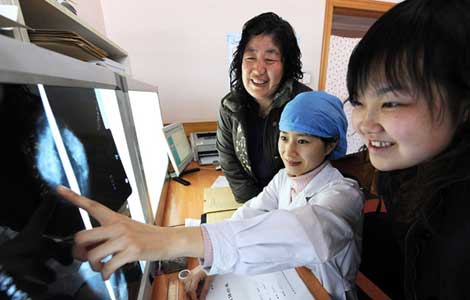Business confidence 'buoying growth'
Updated: 2013-08-27 00:03
By Chen Jia (China Daily)
|
||||||||
NBS sees further evidence that economy is on the mend
China's economic growth is stabilizing, with a strong rebound in momentum as business confidence rises, a government spokesman said on Monday.

A pickup in industrial output, better-than-expected global market conditions and government fine-tuning are combining to generate faster growth, said Sheng Laiyun, spokesman of the National Bureau of Statistics, at a news conference in Beijing.
"The favorable environment can increase business confidence and underpin steady and accelerated growth in the second half of the year," Sheng said. "We are confident that we can achieve the full-year growth target of 7.5 percent."
The basic factors supporting economic expansion haven't changed, but the country needs to wring more growth out of technological innovation, human resources and industrial upgrading to make further progress, Sheng said.
China can no longer depend too much on exports and fixed-asset investment for GDP growth, he added.
He referred to recent data on July industrial production and other aspects of the economy, saying the figures show an improvement.
Deutsche Bank AG said on Monday it was upgrading its forecast for third-quarter GDP growth to 7.7 percent from 7.5 percent. The bank's fourth-quarter GDP forecast rose to 7.8 percent from 7.7 percent.
GDP growth in the second quarter slowed to 7.5 percent from 7.7 percent in the first three months.
Ma Jun, chief economist in China with the German bank, said that since July, economic indicators have signaled a steady uptrend, which is expected to persist in the coming months.
The stronger momentum is being supported by rising prices for commodities such as iron, steel, coal and copper, which stimulated market demand, according to Ma.
"Companies have also shown stronger confidence, which can speed up the velocity of money and encourage investment, as well as boost local governments' fiscal income to pay for infrastructure projects this year and next."
Deutsche Bank said that third-quarter industrial output may increase 9.7 percent year-on-year, up from 9.1 percent in the second quarter.
"As the United States, the European Union and Japan may enjoy better economic conditions in 2014, Chinese exports may see a rebound next year," Ma added.
On Monday, JPMorgan Chase & Co released its research analyst sentiment index for August, which measures market confidence based on overall economic conditions. The index showed a strong rebound of growth momentum, due to accelerating industrial output, an export recovery and stable real estate investment, the US-based bank said.
"Confidence among industries, including automobile manufacturing and cement, improved in August," said Zhu Haibin, chief economist in China at JPMorgan.
The British bank HSBC Holdings Plc has released its preliminary August reading for the manufacturing Purchasing Managers' Index, which hit a four-month high of 50.1 compared with 47.7 in July, the first expansion in the sector since May.
The next reading of the official NBS manufacturing PMI is set for release on Sept 1, and Barclays Capital has forecast it will show a rise to 50.5 in August from 50.3 in July.
Chang Jian, the bank's Chinese chief economist, said: "Recently announced policies designed to stabilize growth, notably the acceleration of railway investment and construction of affordable housing, as well as the modest and gradual recovery in the US and eurozone, appear to have supported demand and led to an earlier-than-expected pickup in China's manufacturing activity."
However, she expressed concern that "modest" policy support, combined with tougher regulatory control of "shadow banking" and local government debt issues, may threaten the sustainability of the domestic demand acceleration.
Sheng also said on Monday that local government debt, which burgeoned when the central government decided to stimulate investment in response to the global financial crisis in 2008, remained within a "safe" range.
"We are monitoring the situation carefully and right now, the issue is under control," Sheng said.

 US preparing for probable strike on Syria
US preparing for probable strike on Syria
 Putting money on full moon
Putting money on full moon
 Language list aims to pass on Chinese culture
Language list aims to pass on Chinese culture
 Cancer patient delivers healthy baby
Cancer patient delivers healthy baby
 Chinese navy starts escort mission at Gulf of Aden
Chinese navy starts escort mission at Gulf of Aden
 McGrady retires, considers career in China
McGrady retires, considers career in China
 Li Na breezes into US Open second round
Li Na breezes into US Open second round
 China and India set to resume military drills
China and India set to resume military drills
Most Viewed
Editor's Picks

|

|

|

|

|

|
Today's Top News
Affluent Chinese pursue overseas properties
Sino-Japanese meeting at G20 ruled out
New time limits for visa processing
China joins global effort to combat tax evasion
Party's plenum to focus on reform
Chinese negotiator in DPRK
Nursing homes to give Tibetans care
WeChat users under scrutiny
US Weekly

|

|







